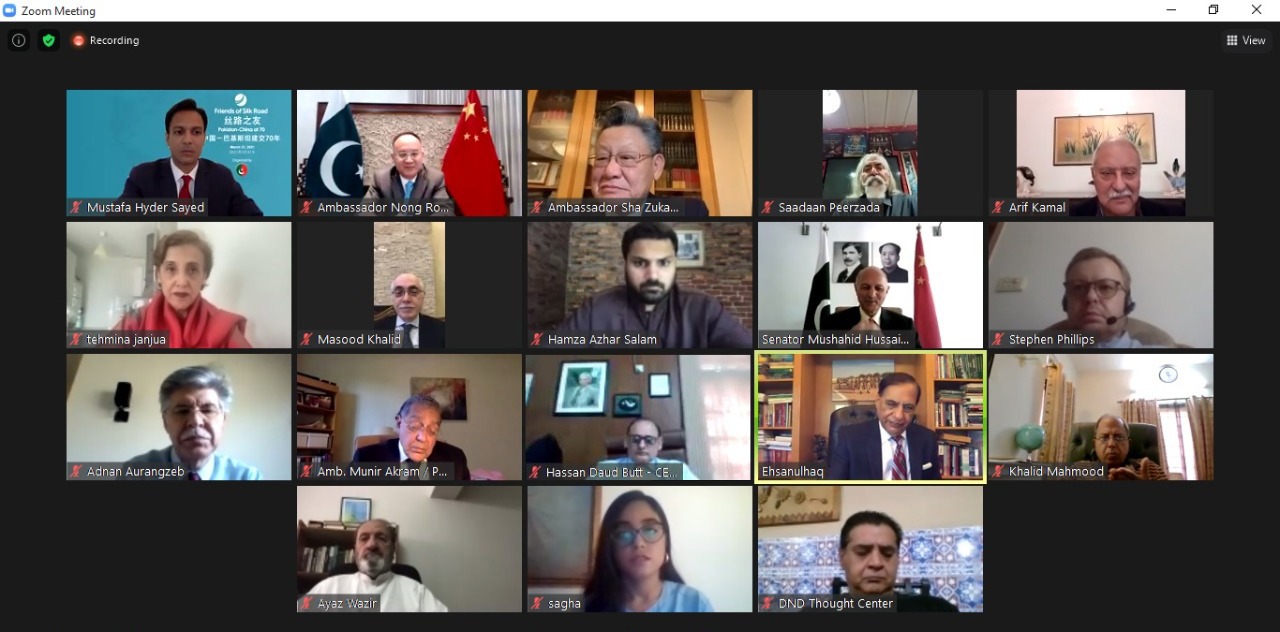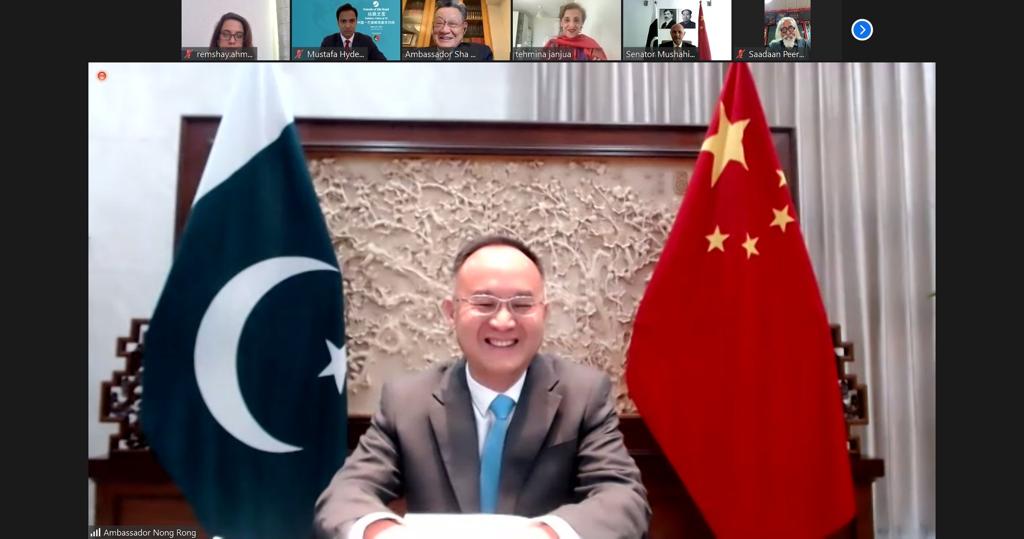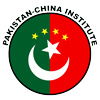Pakistan-China at 70 Webinar: China has directly invested over $ 25 billion in CPEC, says Ambassador Nong Rong; China pivot of Pakistan Foreign Policy, says Ambassador Munjir Akram; 75-80% Pakistani defence purchases from China, says General Ehsan ul Haq. Mushahid thanks China for timely Covid-19 vaccine donations
Source : PCI Date : 01-04-2021
 |
Islamabad, April 1, 2021: Commemorations marking 70 years of Pakistan-China diplomatic ties were kicked off with a Webinar, organized by Pakistan-China Institute under the banner of "Friends of Silk Road", which had distinguished speakers from Pakistan and China. An illustrious panel of keynote speakers including Gen (R) Ehsan ul Haq, former Chairman, Joint Chiefs of Staff Committee of Pakistan, Senator Mushahid Hussain Sayed, Chairman, Senate Foreign Affairs Committee and Pakistan China Institute, Nong Rong, China’s Ambassador to Pakistan, Ambassador Sha Zukang, former Under Secretary-General of the United Nations & President of China - Pakistan Friendship Association, Masood Khalid, Pakistan’s former Ambassador to China, Ambassador Munir Akram, Permanent Representative of Pakistan to the United Nations, Ms Tehmina Janjua, Former Foreign Secretary of Pakistan, & Ms Saliha Agha, youth leader who visited China. The online event was moderated by Mustafa Hyder Sayed, Executive Director of the Pakistan China Institute.
Chinese Ambassador Nong Rong thanked Pakistan for its consistent support to China during the past decades. He said that the bilateral relationship was being further cemented through mutual support and high level consultations and visits. He said China has so far invested $ 25.4 billion in CPEC since its inception, creating 75,000 jobs for Pakistanis and he added, ‘no Pakistani worker was laid off during the pandemic from any CPEC project’. He said Pakistan is the first country to get a donation of Chinese Covid-19 vaccine and he said that the bilateral Free Trade Agreement (FTA) will ‘strive to narrow the trade deficit and deepen economic cooperation’. Ambassador Nong Rong added that the upcoming meeting of the Joint Cooperation Committee (JCC),which is the apex body on CPEC, will focus on socio-economic development, industry and agriculture. He also said that 100 million Chinese had benefited from the elimination of rural poverty in China. Former Chairman, Joint Chiefs of Staff Committee and former DG, ISI General (R) Ehsan ul Haq termed "security cooperation as a significant core area of Pakistan-China relations”. He said that “75-80% of Pakistani defence equipment comes from China and Pakistan accounts for 35% of China's military exports”. He said that China has a proven track record of reliability and Pakistan-China relations had now moved forward from geopolitics into geoeconomics, socioeconomic development, human security and soft power. Former Under Secretary General of the UN and President of the China-Pakistan Friendship Association, Ambassador Sha Zukang said that "Pakistan is the most important country in the region for China" and he said that "Pakistan-China relations will blossom in today's world, where changes not seen in a century, were occurring”. He said that "a strong Pakistan is good for stability in the region and the world".

Pakistan's Ambassador to the UN, Munir Akram termed "China as the pivot of Pakistan's Foreign Policy” and ‘this pivot will remain’ and ‘Pakistan is the strongest defender of China's territorial integrity". He said that "Pakistan-China policies are completely aligned in South Asia, in the Indian Ocean, in Central Asia, in the Asia-Pacific region."
Former Ambassador of Pakistan to China, Masood Khalid said that "China's rise is an established reality” and he also narrated how 50 years ago, ‘despite China's own difficulties during the Cultural Revolution, China provided invaluable support to building Pakistan's heavy industrial base worth almost $ 300 million’, which, he said, ‘in today's world would be a sum in billions’. Former Foreign Secretary Tehmina Janjua quoted President Xi Jinping as telling the Pakistani Prime Minister in 2019 in Beijing that "no matter how the international situation changes, China will always stand firmly with Pakistan". Senator Mushahid Hussain said that “people-to-people relations are the core of the Pakistan-China bond” and he referred to his first visit to China in the early 70s as a young teenager in college, "I am very fortunate to have witnessed the remarkable transformation of China in the past 5 decades through my nearly 100 visits to China". He termed CPEC as a ‘success story whose results are obvious in the resolution of Pakistan's long-standing electricity shortages, greater inter-provincial connectivity through roads and motorways, the functioning of the Gwadar Port which is now emerging as the hub of regional connectivity with Afghanistan and Central Asia and empowerment of women in such less developed areas as Thar”. He also thanked China for gifting 1.5 million doses of Covid-19 vaccine at a time when these vaccines were urgently needed.
Senator Mushahid Hussain also said that 2021 is the 50th Anniversary of Pakistan's historic role in arranging the secret visit of Dr. Kissinger to China which resulted in normalisation of China-American relations which was the biggest "diplomatic coup" of that period. He lauded the role of Pakistan's Foreign Office professionals like Foreign Secretary Sultan Mohammad Khan and Pakistan's Ambassador to the United States, Agha Hilaly, who assisted President General Yahya Khan in this secret mission. He added that during a recent webinar on March 20, organized by the Chinese government, in which he and Dr. Kissinger participated, the American statesman had recognized and appreciated Pakistan's pivotal role.
Mustafa Sayed, Executive Director, Pakistan China Institute termed China as a "champion of the developing world" and he also lauded China's poverty alleviation strategy which is "an example that developing countries can follow". The Webinar lasted for 2 hours and 30 minutes, including an attentive 45 minutes Q&A and discussion among participants, who numbered about 80 diverse and distinguished audience of former policy makers, students and scholars and representatives of think tanks.

